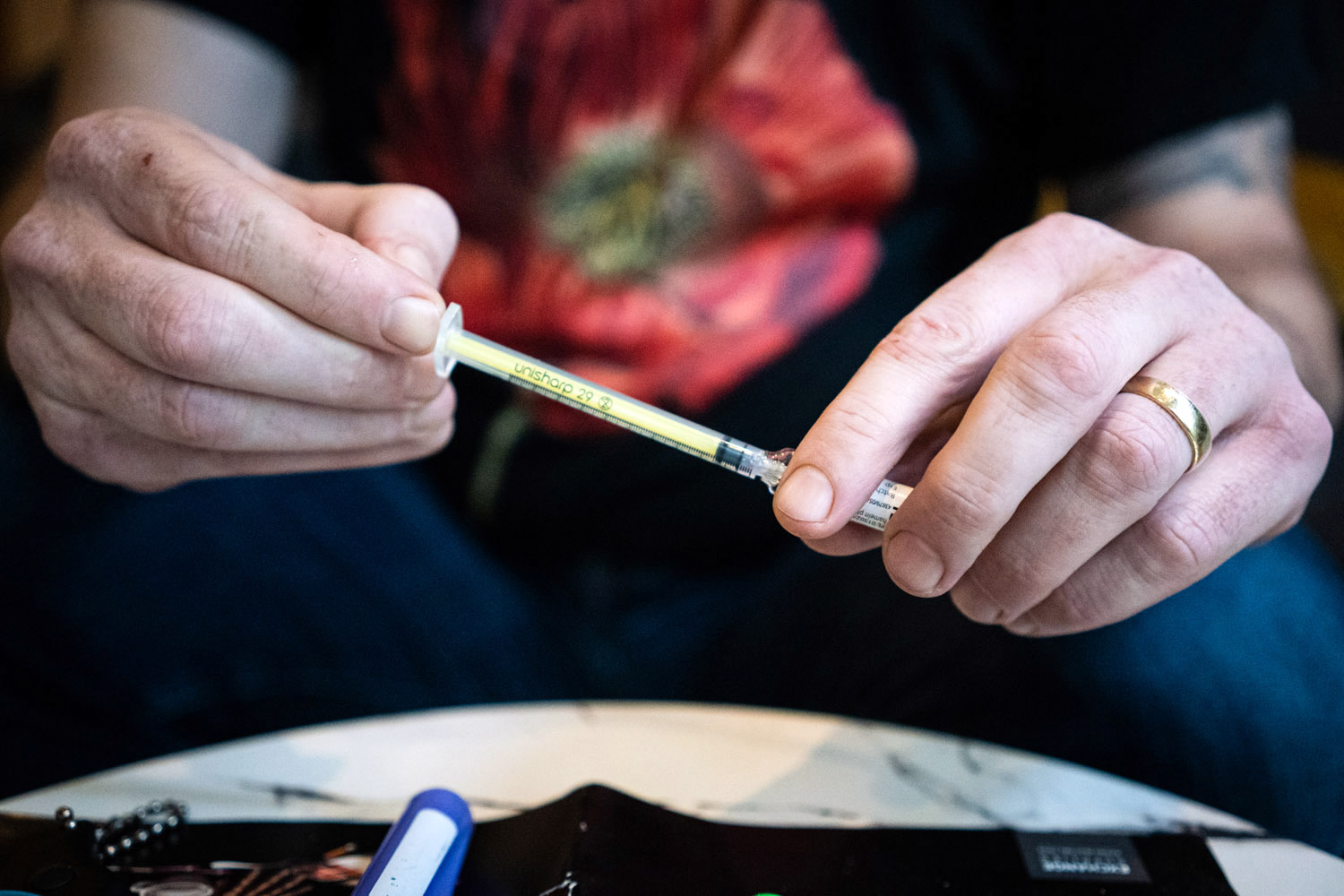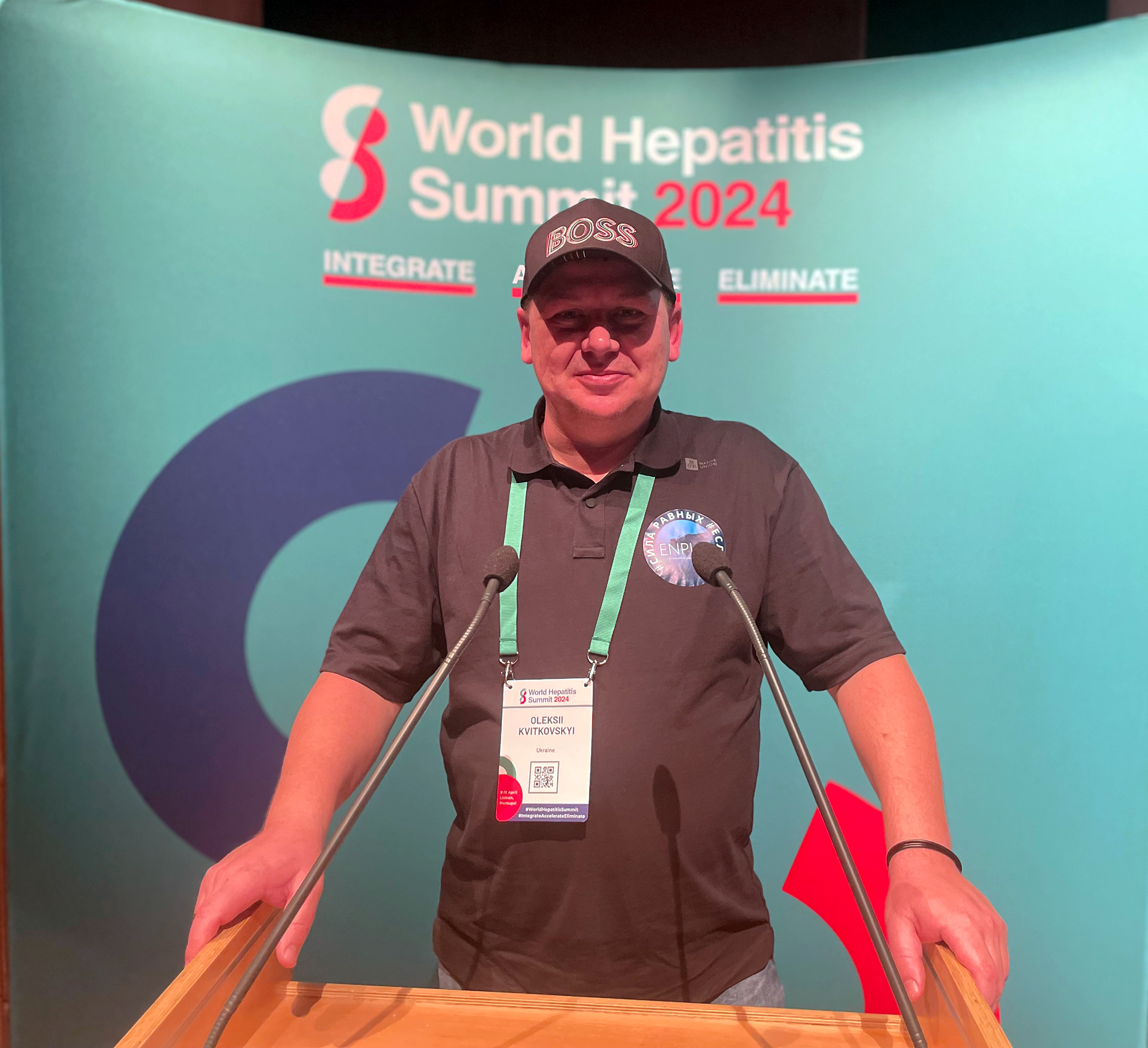“These are our experiences and our feelings. Only we can assess how effective a particular treatment is and how effective a particular approach to hepatitis C prevention and treatment is.”
Oleksiy Kvitkovskyi
Advocate for the community of people who inject drugs
Oleksiy Kvitkovskyi is a passionate advocate, representing the views, needs and challenges faced by the community of people who inject drugs. A Ukrainian national, Oleksiy began injecting drugs in 1993 and, in 2008, sought support to reduce his reliance through a therapy called opioid agonist treatment.
Opioid agonist treatment—sometimes called OAT— is a form of harm reduction for people who use drugs and involves taking medications like methadone or buprenorphine that prevent withdrawal symptoms and reduce cravings for opioids. This treatment reduces the frequency and urgency to inject drugs. Traditionally it requires consistent adherence to oral medications, and patients are often required to come to clinics daily to pick up the medicine – a challenge when centers are far from where people live. For Oleksiy, it meant half-day trips to the dispensing site.
“When I first became an OAT patient, I lost my job because I had to go to the OAT office every day. At that time, I dreamed of a product that I could use just once and it would last for a month, or at least for a week,” said Oleksiy. “But not to be tied to the OAT office like a dog on a leash. Back then, in 2008, it seemed like a fantasy to me.”
In the intervening years, Oleksiy rose to become a prominent voice in his community, advocating for self-administration of OAT medication. As the head of the board of the Resource Center for All-Ukrainian Association of People with Drug Dependence VOLNA-Donbass, and the secretary of the General Assembly of the Eurasian Network of People Who Use Drugs (ENPUD), he worked to improve harm reduction programming across Eastern Europe and Central Asia.
“Nowadays over 90% of OAT patients in Ukraine receive the medicines in their hands for self-administration. For many it became a kind of ritual: you wake up in the morning, wait until you start to show slight signs of mild withdrawal and then you take your magic pills and the day begins,“ he said. “I myself had to go through this ritual for 15 years, but I wanted something else. I wanted freedom from this swing, I wanted independence, I wanted to be equally good and comfortable all the time.”
Because of his work in expanding OAT medicines, Oleksiy was one of the first to learn that in 2023 a pharmaceutical company donated long-acting depot buprenorphine to Ukraine and involved himself immediately in the process.
“I guess my desire was so strong that the higher powers heard my prayers,” he said.
Though people who inject drugs represent roughly 10% of the 50 million people infected with hepatitis C worldwide, injection drug use contributes to 43% of all new infections.
Marginalized groups including people who inject drugs are disproportionately affected by diseases like hepatitis C. Though they represent roughly 10% of the 50 million people infected with hepatitis C worldwide, injection drug use contributes to 43% of all new infections. Unitaid has a longstanding commitment to address hepatitis C and is stepping up support especially among people who use drugs with a US$31 million investment in harm reduction efforts launched last year across 10 low- and middle-income countries.

In partnership with Frontline AIDS, Médecines du Monde and PATH, Unitaid’s funding will support the integration of hepatitis C testing and treatment in harm reduction services, while trialing the use of two underused products to prevent infection: low dead space syringes and new slow-release formulations of buprenorphine, which provide longer-term OAT support through injection. The investment will generate evidence to inform WHO global guidance.
Central to this work is Unitaid’s hepatitis C portfolio Community Advisory Board which is led by the International Network of People who Use Drugs (INPUD). The Community Advisory Board is made up of communities from the project countries who meet to discuss the design and development of the research, and who will be involved throughout implementation of the projects. The goal for Unitaid and its implementing partners is to ensure that individuals directly impacted by disease are not just consulted, but that they are helping to shape the health solutions that will be designed to serve them. The Community Advisory Board for this project is made up of two people from each country that will have pilot sites: Armenia, Egypt, Georgia, India, Kyrgyzstan, Nigeria, South Africa, Tanzania, Ukraine and Viet Nam.
Low-and-middle-income countries are home to 80% of new hepatitis C infections. New medicines are highly effective, but most people do not have access – just 36% get a diagnosis and only 20% access treatment. The disease is curable, though when left untreated, hepatitis C can lead to serious liver disease, cancer and death.
Currently, Ukraine is the only low- and middle-income country where the relatively new, long-acting injectable buprenorphine is used. It is injected using depot technology, where a liquid is injected under the skin, forming a gel. The drug is then released slowly and consistently over the course of a week or a month.
Long-acting depot buprenorphine has the potential to help overcome challenges clients face with daily visits to distribution sites, stigma, and fear of criminalization. Oleksiy is representing the community of people who use drugs from Eastern Europe and Central Asia on the Community Advisory Board, helping Unitaid and partners understand how best to expand access to this long-acting OAT medication.
“I am happy to share our experiences at the Unitaid hepatitis C portfolio Community Advisory Board, because I want Buprenorphine Prolonged Action to develop in the world. After all, not all countries have the same situation as in Ukraine, where more than 90% of OAT patients are able to receive OAT preparations on their own, for self-administration,” said Oleksiy.
As the project is still in the early research phase, recommendations that the CAB have made so far are ensuring that the pilot studies that will be conducted across all 10 countries are culturally sensitive, adaptable, participative and respectful for the people it will serve. So far, Oleksiy and fellow advisory board members have seen that their concrete suggestions on research protocols were adopted.
“In certain countries people cannot live a full life because of draconian laws, according to which even palliative patients, or rather their relatives have to come every day to get medicines, not to mention healthy people. For these people, long-acting depot buprenorphine is more than just a medicine. It is a salvation and a way of re-socialization for thousands of OAT patients.”
Oleksiy Kvitkovskyi
Oleksiy’s journey and leadership with the Community Advisory Board in Ukraine draws attention to the important role that lived experiences play in combating public health crises like hepatitis C. It is a reminder that empowering those most affected by health issues to lead the way is not just beneficial—it’s imperative for creating lasting, meaningful change. Community voices were also a key theme at this year’s World Hepatitis Summit in Lisbon Portugal on 9-11 April, where Oleksiy joined Unitaid and partners to advocate on behalf of people who use drugs in the Eastern Europe and Central Asia region.

“I am very satisfied with my participation in the Community Advisory Board. It was a very important experience for me. It was easy for me to work because I realized that my knowledge and my experience can help many people feel comfortable. I look forward to continued involvement on the CAB as I can share my experiences with others and hear other people’s opinions which is also very important to me.”
© 2024 Unitaid